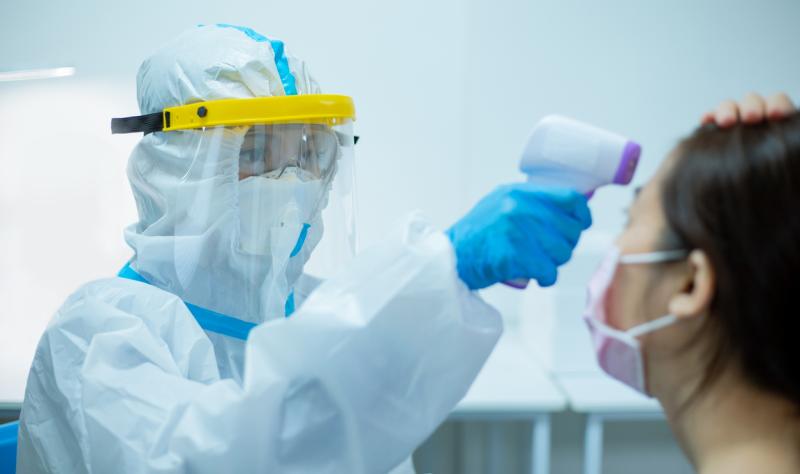News Scan for Oct 21, 2022


Survey: A third of US military find exercise difficult 1 month post-COVID
A third of US active-duty military service members who tested positive for COVID-19 reported new-onset or more difficulty with exercise and daily activities 1 month after diagnosis, but these symptoms diminished to pre-infection levels after 6 to 9 months, according to research presented at this week’s Infectious Diseases Society of America (IDSA) ID Week in Washington, DC.
The research, presented by Stephanie Richard, PhD, of the Uniformed Services University of the Health Sciences, consisted of fitness surveys completed 1, 3, 6, 9, and 12 months after COVID-19 diagnosis. Of the 5,910 respondents, 55% tested positive for COVID-19 at least once during the study period. Over 75% were young adults, and over half were men.
In addition to the 34.3% of respondents who reported decreased exercise tolerance (versus 14.8% in uninfected participants), 43.2% said their service-mandated physical fitness test scores were still lower than normal at 1 year, compared with 24.3% of uninfected participants.
Infected participants’ reports of difficulty exercising and performing daily activities were received more often within 1 month of diagnosis, falling in prevalence slightly, to 24% and 18%, respectively, at 1 year.
The most common symptoms were shortness of breath and fatigue.
“Contracting COVID-19 can have a negative impact on functioning––including carrying out daily activities and exercising,” Richard said in the release. “Even in a younger, generally healthier population like the U.S. military, COVID-19’s effects can persist for months and months.”
The surveys also revealed COVID-19 vaccines’ protective effect. “Vaccinated individuals, even if they had breakthrough infections, did not experience as much of a long-term effect on exercise and daily activities,” said senior author Simon Pollett, MBBS, also of the Uniformed Services University of the Health Sciences. “These results underscore the value of vaccination, not just for preventing death and disease but for preserving long-term quality of life.”
Oct 20 IDSA news release
COVID-19 mRNA vaccine efficacy in adults falls after 4 months, data show
The estimated vaccine efficacy (VE) of monovalent mRNA COVID-19 vaccines against hospitalization in US adults fell over time, from 79% at 120 days to 41% thereafter during the Omicron BA.1/BA.2-dominant period and from 60% to 29% during BA.4/BA.5 dominance, according to a study published today in Morbidity and Mortality Weekly Report (MMWR).
Unlike the newly authorized bivalent (two-strain) COVID-19 booster vaccines, the monovalent (single-strain) version doesn’t contain mRNA from the currently dominant BA.4/BA.5 subvariants.
The Centers for Disease Control and Prevention (CDC) COVID-19 Emergency Response Team led the study, which compared the VE against hospitalization of two, three, and four doses of monovalent COVID-19 mRNA vaccine with no vaccination in adults with healthy immune systems from Dec 26, 2021, to Aug 31, 2022.
Participants (2,406 infected case-patients and 2,324 uninfected controls) were enrolled at 21 hospitals in the IVY Network in 18 states. Median case-patient ages during BA.1/BA.2 and BA.4/BA.5 were 65 and 69 years, respectively. Of patients enrolled during BA.1/BA.2, 34% were unvaccinated, 30% received two doses, 34% received three doses, and 2% received four doses.
Of 1,378 patients included during BA.4/BA.5, 27% were unvaccinated, 24% received two doses, 37% received three doses, and 12% received four doses. BA.1 became the dominant circulating SARS-CoV-2 subvariant in December 2021, followed by BA.2 in March 2022 and BA.4/BA.5 in June 2022.
Amid BA.1/BA.2, VE against hospitalization was 63% 14 to 150 days after a second dose, falling to 34% after 150 days. Likewise, VE was 79% after a third dose, dropping to 41% after 120 days. Seven to 120 days after a fourth dose, VE was 61%.
Similar trends were seen during BA.4/BA.5, although the confidence intervals for VE estimates between time intervals since the last dose overlapped. Fourteen to 150 days and more than 150 days after a second dose, VE was 83% and 37%, respectively.
VE 7 to 120 days after a third dose was 60%, waning to 29% after more than 120 days. Seven to 120 days after a fourth dose, VE was 61%.
“Eligible adults aged ≥18 years should receive an updated bivalent COVID-19 mRNA vaccine to maximize protection against BA.4/BA.5 sublineages and to prevent COVID-19–associated hospitalization,” the researchers wrote.
Oct 21 MMWR study
Microbiome drug for recurrent C difficile shows durable response
A secondary analysis of results from a phase 3 trial shows that an investigative microbiome therapeutic reduced rates of recurrent Clostridioides difficile infection (rCDI) through 24 weeks and was well-tolerated, researchers reported this week in JAMA.
For the analysis, researchers assessed data on rCDI rates and treatment-emergent adverse events through 24 weeks from ECOSPOR III, a double-blind multicenter trial conducted from July 2017 to September 2020. The trial randomized adults with rCDI to receive four daily capsules of SER-109—a therapeutic composed of purified Firmicutes bacterial spores developed by Seres Therapeutics—or a placebo for 3 days. Earlier published results showed SER-109 was superior to placebo through 8 weeks for treatment of rCDI (defined as three or more episodes within 12 months).
Among the 182 randomized patients, 63 had rCDI through 24 weeks, with a significantly lower proportion in the SER-109 group (19 [21.3%] vs 44 [47.3%] placebo patients). Benefit from SER-109 was evident at week 2.
Treatment-emergent adverse events (including abdominal distension, constipation, and diarrhea) occurred in 5% of patients, and more frequently in the SER-109 group than the placebo group. Serious adverse events occurred in 15 patients in the SER-109 group and 19 in the placebo group, but none were considered drug-related. Adverse events were reported in 7 patients (4 in the SER-109 group and 3 in the placebo group).
“These data support a potential role for this investigational oral microbiome therapeutic in the treatment of patients with this debilitating infection,” the authors wrote.
Oct 19 JAMA research letter
Jan 21 CIDRAP News scan



